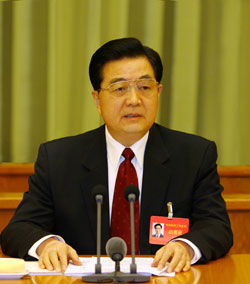China to tighten monetary policy in 2008
Updated: 2007-12-05 19:00
China will shift its monetary policy "from prudent to tight" in 2008, to prevent its economy from overheating and to try to contain accelerating inflation, according to the three-day 2007 Central Economic Work Conference concluded on Wednesday.
|
|
The conference, an annual event initiated more than a decade ago, serves as a crucial mechanism for the Communist Party of China (CPC) Central Committee and the State Council, the cabinet, to make policies to govern the Chinese economy.
China will maintain a "prudent" fiscal policy for the coming year.
Various monetary instruments should be used to regulate liquidity and to strictly control the size of loans and frequency of credit extension, so as to better regulate domestic demand and balance international payments, said the conference.
China raised interest rates five times and reserve requirement ratio nine times this year.
The conference said that with a prudent fiscal policy and a tight monetary policy, China aims to prevent economic growth developing from rapid to overheating, and to prevent price rises evolving from structural to evident inflation.
"A tight monetary policy can develop a progressive effect, which will help curb the overheating in markets of assets, including equities and real estate, and then cap price rises," said Cao Honghui, an economic researcher with the Chinese Academy of Social Sciences (CASS).
China has been implementing a prudent monetary policy since 1997. From 1998 to 2002, the country increased money supply to counter deflationary pressure.
From 2003 to 2007, the monetary policy has been tigtened in order to help address changes in economic development, including rapid growth in credit extension, investment and foreign exchange reserves.
"The new policy reflects the accurate judgment by the central government on China's current economic situation, which is under pressure from further price rises and unduly fast loan growth," said Peng Xingyun, a senior researcher with the Research Institute of Finance under the Chinese Academy of Social Sciences.
The country's consumer price index (CPI) rose a decade-high 6.5 percent in October, well above the government-set alarm level of three percent. Observers here said the major inflation indicator will most likely rise to a new high in November.
In the first 10 months, Renminbi-denominated loans were 1.1 times the amount for the whole of last year.
Yu Yongding at CASS research institute of world economy and politics said that four percent was the CPI ceiling that China could tolerate. If the inflation measurement increased higher it would send a signal to the central bank that a tight monetary policy was necessary.
|
|
|
||
|
||
|
|
|
|


